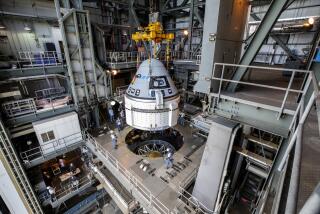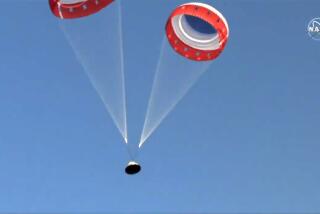NASA Postpones Launch of Discovery
- Share via
The launch of the space shuttle Discovery will be delayed from May until at least July to allow engineers time to replace sensors in the craft’s hydrogen fuel tank, NASA said Tuesday.
A malfunction in the sensors, which monitor hydrogen levels in the tank, could cause the shuttle’s rocket engines to shut down prematurely, potentially endangering the mission. Problems with the sensors caused a delay in Discovery’s last mission, and engineers said the defects might stem from a manufacturing problem that caused a loose connection between the 10-year-old sensors and their leads.
Replacing the sensors, which will require crews to enter the tank while it is in the upright position, will take about three weeks, and that “will move us out of the May launch window” and into the next possibility in July, shuttle program manager N. Wayne Hale Jr. said at a Houston news conference.
The delay will give NASA time to complete other tasks as well, such as wind-tunnel testing of changes to the foam covering of the fuel tank and repair of the craft’s robotic arm.
The arm was cracked last week when workers bumped a platform into it while trying to clean up glass from a broken light bulb that fell into the shuttle bay. The delay allows for the arm to be sent to the Canadian manufacturer for repairs.
The wind-tunnel testing will measure airflow over the external fuel tank after the removal of a thick, manually applied foam layer designed to improve airflow around the tank’s external cables and connections.
A big chunk of the foam came loose and struck the wing of the shuttle Columbia, leading to its breakup on reentry in February 2003. More foam came loose during Discovery’s launch in July. Although the foam did not strike Discovery, the shuttle fleet was temporarily grounded until a solution could be found.
The solution was to remove the foam, but engineers have not yet tested the aerodynamics.
More to Read
Sign up for Essential California
The most important California stories and recommendations in your inbox every morning.
You may occasionally receive promotional content from the Los Angeles Times.













